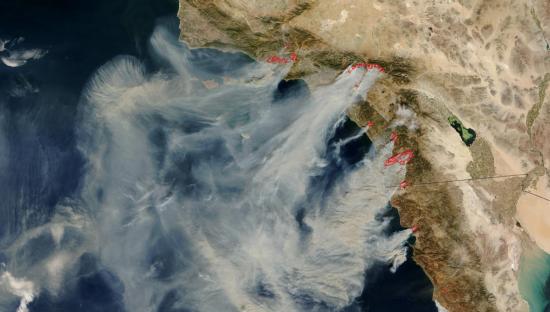I’m from San Diego. We don’t get a whole lot of extreme weather in San Diego. My comfortable temperature tends to range from 70 to 80 degrees. We don’t get snow, no hurricanes, no tornadoes. But we do get the Santa Anas—hot dry winds blowing out of the desert. Which means we get wildfires. I’m fairly familiar with wildfires. So much so, that I once mistook snow falling from the sky for ash falling from the sky. (Like I said, I’m from Southern California).

Our last big fires were in 2007, when half a million people were evacuated from their homes, including myself. It was a scary time. In San Diego, we were surrounded. There were fires to the north, east and south of us, and the ocean to our west. There was no way out. So much of Southern California was up in smoke, satellite images made it look like the entire bottom half of our state was burning. For weeks after, we walked around wearing masks as the winds tried to make up their minds about which way to blow the smoke. At the time I worked for a social service program with a fairly robust wildfire recovery program, and I saw firsthand the damage the fires had caused for so many families.
Now, five years later, wildfire season is once again upon us, and conditions aren’t looking so good. California rainfall was below-average this year, causing our vegetation to dry out sooner than expected. When you mix that with the high temperatures being predicted for this summer, the threat for fire danger is high. The National Oceanic and Atmospheric Administration has already started putting out critical fire weather headlines for Southern California, and elsewhere in the southwest.
Help mitigate this fire season by making sure you’re prepared. UC Agriculture and Natural Resources has a wealth of information to help you mitigate the wildfire potential in your area and keep your home safe. The Homeowner’s Wildfire Mitigation Guide, The Combustibility of Landscape Mulches and Fire Information Engine Toolkit compiled by scientists from UC Cooperative Extension and UC Berkeley are great resources for homeowners in fire-prone areas. The information will help you understand how houses ignite and what to look for when fire-proofing your home this season.
Landowners living in the wildland urban interface will find this S.A.F.E. Landscapes Southern California Guidebook useful for creating fire safe landscapes to help protect their homes. Likewise,Wildfire Zone, a collaboration between University of California Cooperative Extension and the County of San Diego, offers tips for reducing the risks and hazards of wildfires both in English and Spanish. More resources can also be found in the ANR Catalog.
Smokey says “Only you can prevent forest fires.” He’s right. Do your part, and make sure you’re prepared this wildfire season.